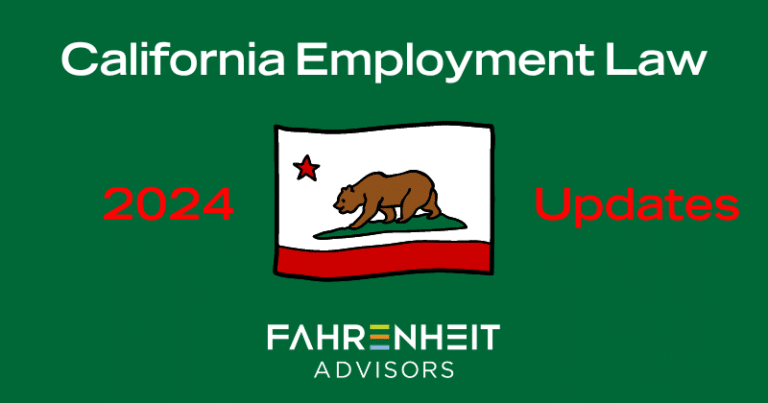New California Employment Law Updates for 2024

As more employees continue to work remotely and businesses seek out top candidates from across the United States, employers often contemplate hiring candidates in states that they have never operated within before. The decision to hire an employee in California should not be taken lightly, as there are numerous employment regulations in California that are unique and may place an unexpected administrative or financial burden on your business.
In 2024, California has expanded its required paid sick leave, added reproductive loss leave, increased the minimum wage, and added industry-specific minimum wages. Additionally, California has added protections for employees and applicants regarding reporting criminal history, wage disclosures, cannabis use, and workplace violence prevention. Let’s cover five major employment law updates happening in California effective in 2024.
5 major updates to california employment law
1. PSL – Paid sick leave
Since 2015, the Healthy Workplaces, Healthy Families Act has required employers with at least one employee in California to provide paid sick leave to these employees at an accrual rate of 1 hour per 30 hours worked or a minimum of 3 days (24 hours) if frontloaded.
In 2024, paid sick leave has been expanded in California to a minimum of 5 days (40 hours) if frontloaded. Employers continue to have the option to allow employees to accrue paid sick leave at a rate of 1 hour per 30 hours worked. There are benefits to the company when frontloading paid sick leave, including ease of administration and no requirement to carryover unused paid sick leave from year to year. If accrued, as of January 1, 2024, employees must be allowed to accrue up to 10 days (80 hours) of paid sick leave and they must be allowed to carryover any unused paid sick leave from year to year up to the annual accrual cap. Employers may limit the usage of accrued paid sick leave to a maximum of 5 days (40 hours) within one year.
Employees must be allowed to use available paid sick leave once they reach 90 days of employment. It can be used for their own or their family member’s illness or to deal with situations related to domestic violence, sexual assault, and stalking.
Employees are not entitled to a payout of paid sick leave upon separation of employment*, but their forfeited balance must be reinstated if they are rehired within one year. Employers may choose if they will allow employees to use paid sick leave before it is accrued, but negative balances generally cannot be recouped upon separation from the company. The available paid sick leave balance must be displayed on wage statements or another written document supplied on pay dates.
There are currently eight localities within California that have separate paid sick leave policies that must be implemented if the employer provides additional benefits to employees in that city beyond the state’s paid sick leave. Those include: Oakland, San Francisco, Berkeley, Santa Monica, Emeryville, Los Angeles, West Hollywood, and San Diego.
*As an employer, if accrued paid time off, personal, or vacation leave is provided, earned (accrued) but unused paid leave must be paid out upon employee separation. This includes paid sick leave if it is provided as part of a combined PTO policy and not separately accrued or frontloaded.
For additional information regarding California’s Paid Sick Leave requirements, visit the State of California Department of Industrial Relations page here.
2. reproductive loss leave
As of January 1, 2024, any private-sector employer that has five or more employees in any location, must provide their employees that reside in California with up to 5 days of job-protected unpaid reproductive loss leave if they have been employed for at least thirty days prior to taking the leave. Employers have the option to provide paid reproductive loss leave instead of allowing a substitution of other available paid leave.
Reproductive loss leave is provided to birthing and non-birthing parents for failed adoptions, failed surrogacies, miscarriages, stillbirths, and unsuccessful assisted reproduction procedures. The five days do not have to be taken consecutively, but they must be taken within three months of the reproductive loss event. For those employees that experience multiple reproductive losses within a year, they can be limited to a maximum of 20 job-protected reproductive loss days within twelve months.
Employees are not required to submit medical documentation substantiating the need for reproductive loss leave and employers are required to keep any reproductive loss leave information received confidential. Employers should train supervisors, managers, and human resources personnel about this new leave category so that inadvertent disclosures or unnecessary requests for additional information do not occur.
For additional information regarding California’s Reproductive Loss Leave requirements, please review the Fact Sheet here.
3. minimum wages
exempt/non-exempt
As of January 1, 2024, non-exempt employees, including tipped employees, in California are entitled to a minimum wage of $16 per hour. Exempt employees in California must earn at least two-times the state minimum wage, $66,560 annually (well above the current federal minimum of $35,568 that is under consideration for update), and meet the other standards of exempt-level work. Additionally, there are forty different localities in California with additional minimum wage requirements that change on either January 1st or July 1st.
fast food workers
In addition to the state and local minimum wages, national fast food chain non-exempt workers (as of April 1, 2024) are entitled to a $20 per hour minimum wage. This minimum wage will be increased annually by 3.5% or the inflation index, whichever is less. Exempt workers within national fast food chains must earn two times the fast-food minimum wage, $83,200 annually, and meet the standards for exempt-level work.
Health care facility workers
As of June 1, 2024, health care facilities will be required to pay non-exempt employees a minimum of $18, $21, or $23 per hour, depending on the type of facility. Exempt employees will be required to earn at least 1.5 times the applicable healthcare minimum wage or 2 times the regular state minimum wage, whichever is higher, and meet the standards for exempt-level work. These minimum wages apply to all employees in the health care facility that provide patient care, health care services, or services supporting that care. This includes janitors, security guards, reception workers, food service workers, gift shop attendants, and medical coding or billing personnel. The new minimum wages do not apply to contracted workers that are not employed by the facility, specifically those that are contracted through another provider to deliver supplies, pick up waste, and provide medical transportation.
For additional information regarding California’s Minimum Wage requirements, visit the State of California Department of Industrial Relations page here.
4. California employment regulations
Posting open positions and interviewing in California comes with its own set of challenges that employers in other states are not required to follow. Employers with fifteen or more employees must post the salary range for any open positions if they are recruiting in California. Employers with less than fifteen employees must still provide the salary range for a position if asked by an applicant or current employee. Employers cannot ask applicants about wages earned at previous employers or use any previous employment salary information when screening, interviewing, or making offers to applicants or employees. Additionally, employers cannot include any statements in their postings, applications, or policies disqualifying candidates with criminal histories.
In California, employers must make a conditional offer of employment before asking a candidate about their criminal history or running a background check. If a candidate voluntarily discloses their criminal history in the interview process, the employer must ignore that information in their evaluation of the candidate until after an offer is made. If a candidate has a criminal record, employers must individually assess the nature and seriousness of the offense, the time passed since it occurred, and if it has a direct impact on the job they are seeking. Employers must follow the pre-adverse action process before rescinding a job offer (or taking an adverse employment action on a current employee) based upon background check results. In California, employers cannot require the applicant or employee to provide specific documentation regarding the conviction in question.
As of January 1, 2024, California has a new protected class – employers cannot discriminate against a candidate or employee for their off-duty, off-site cannabis use. When hiring, employers cannot request any information about prior cannabis use or consider information about cannabis use obtained in a criminal background check. This applies to all employers in California, except those with employees in the building and construction trades or those that are subject to a federal government background investigation as a required part of their job. Even manufacturing companies that are used to qualifying for “safety sensitive” position exemptions are subject to California’s new cannabis regulations. Employers may still maintain drug-free policies that prohibit the possession, use or impairment by cannabis in the workplace (only). Employers cannot take adverse employment actions, like terminating an employee or refusing to hire a candidate, based on drug-screening results that find non-psychoactive cannabis metabolites.
Posters, guides and fact sheets related to these and other California-specific employment topics can be found on the State of California Civil Rights Department page here.
5. workplace violence prevention
By July 1, 2024, nearly all employers in California will need to create a workplace violence prevention plan, train employees on the plan, and record workplace violence incidents and make those records available to employees and their representatives within fifteen days of request. Fortunately, employers that only have employees that work remotely in a location outside of the employer’s control (like a home), or if they have less than ten employees that work in a location in California that is not accessible to the public, they do not have to comply with this regulation. Law enforcement agencies and health care facilities that are already subject to Cal/OSHA’s Violence Prevention Health Care regulation are also exempt from this new requirement.
There are thirteen defined components that must be included in the workplace violence prevention plan, including the definitions of workplace violence, identifying who’s responsible for implementing the plan, and the procedures for how to report incidents, investigate incidents, report results, and correct hazards. Employers must train employees on the plan details in language that can be understood by the employees and include interactive question and answer opportunities. This training must occur when the plan is first established, any time it is changed or a new hazard is identified, and annually thereafter.
Click here to view the California Department of Industrial Relations’ Division of Occupational Safety and Health’s Fact Sheet regarding Workplace Violence Prevention.
there’s so much more…
We’ve only discussed the new 2024 California employment regulations. There are so many more complexities when operating a business with California employees. There are long-standing specific regulations around sexual harassment training, required postings and pamphlets, timing of meal and break periods, daily overtime pay, final pay checks, and non-compete, confidentiality, non-disclosure, and arbitration agreements. Plus, there are additional benefits that must be offered to employees in California including retirement plans, paid family leave, state disability insurance, pregnancy disability leave, and family rights (i.e. the CFRA which is similar to FMLA but specific to California employers with just 5 or more employees).
Let the experts at Fahrenheit Advisors help you craft your leave and employment policies, update your handbook, make sure your interviewing and pay practices are acceptable, and ensure overall regulatory compliance for your multi-state business. We are ready to help you move Straight. Forward. through these complicated business decisions
 about the author
about the author
 As a Strategic HR Business Partner and Director with Fahrenheit Advisors’ Human Capital Practice, Jennifer Bartlett brings 20+ years’ professional experience in Human Resources, Leadership, Administration, Marketing, Education and Law to her clients. She provides excellent service, counsel and leadership to clients, executives, managers, employees, candidates, and customers. Her experience ranges from for-profit, individually owned, private equity backed, publicly traded, start-up, public, and non-profit multi-state companies (including California). She is a subject matter expert in all aspects of HR including recruitment, retention, on-boarding, employee relations, employee engagement, performance management, training and development, benefits and payroll administration, compensation, legal compliance, and strategic organizational planning.
As a Strategic HR Business Partner and Director with Fahrenheit Advisors’ Human Capital Practice, Jennifer Bartlett brings 20+ years’ professional experience in Human Resources, Leadership, Administration, Marketing, Education and Law to her clients. She provides excellent service, counsel and leadership to clients, executives, managers, employees, candidates, and customers. Her experience ranges from for-profit, individually owned, private equity backed, publicly traded, start-up, public, and non-profit multi-state companies (including California). She is a subject matter expert in all aspects of HR including recruitment, retention, on-boarding, employee relations, employee engagement, performance management, training and development, benefits and payroll administration, compensation, legal compliance, and strategic organizational planning.

